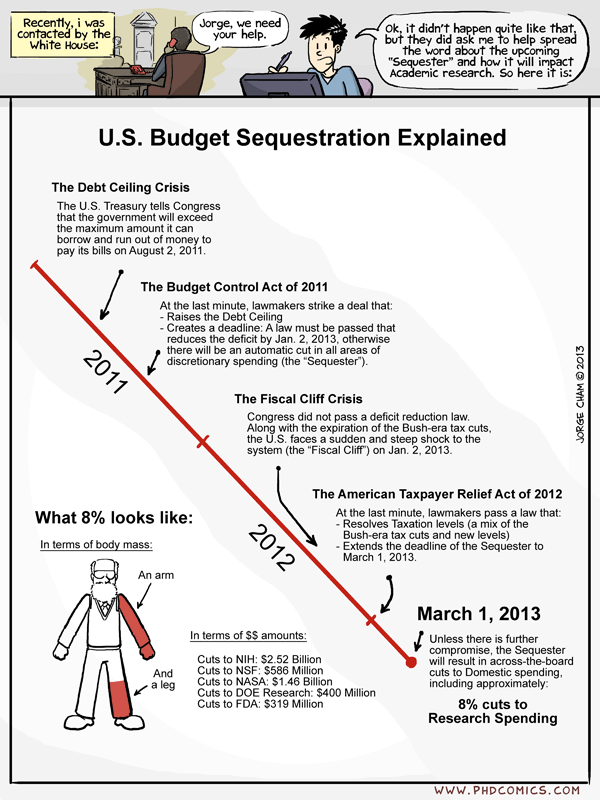Great commentary on sequestration's impact on research! National media should talk about this and YOU should read it!!!
Today Jeffrey T. Leek and Steven L. Salzberg published a paper commentary in Genome Biology today titled “Sequestration: inadvertently killing biomedical research to score political points” (Leek & Salzberg, 2013) which I think is a must read for anyone. Seriously!
I do not mean anyone involved in research, or all scientists. I mean, this commentary should be in the national media. Why?
Well, let me approach the technical side first. You might think that anything that appears in a scientific journal—despite any efforts to make it accessible to the general public—will rely on words whose meaning is mostly only understood by scientists. That is not the case in this commentary: it is a dual letter meant to be read by those in Congress, but it is also an educational commentary for the general public.
The main reason why you should be reading this commentary is that the consequences of the ‘sequester’ are going to affect you. So if you are interested in your future and the well-being of those who you care for, then you should read it. And if you don’t know what the sequester is and how it will impact research, well, that’s another reason why you should read this commentary. Plus you might want to look at this (serious) comic from PhD comics (© Cham, 2013) to get an overall idea. Note that it was published before sequestration hit in.

Going back to the commentary piece by Leek and Salzberg, I can imagine someone refuting like this:
Hey, but I don’t live in the United States so it doesn’t affect me.
That is true in a sense because you will likely be affected by your own country’s policies more directly, and specially in policy topics that have short term impact. Nevertheless, any breakthrough made by U.S.-based research for the most part (aka, when politics doesn’t get in the way) will reach you. After all, Leek and Salzberg cite (Alivisatos et al in The Atlantic, 2013) where the following statement is made:
Nobel Prize-winning economist Robert Solow has calculated that over the past half century, more than half of the growth in our nation’s GDP has been rooted in scientific discoveries – the kinds of fundamental, mission-driven research that we do at the labs.
The claim that it affects other countries is just a generalization of the previous result and what I would consider some common sense. If this is not enough to attract your interest, then you should take a look at Salzberg’s previous comment “A breakthrough cure for acute leukemia?” that is a showcase example of successful biomedical research funded by the same institutions being hit by sequestration.
I hope to have convinced you to read Leek and Salzberg’s commentary by now. So let me talk a little bit about the things that I liked the most.
Most of all, I like the tone they used because this is not a silly matter and while it may sound as alarming as the boy who cried wolf, the reality is that the wolf does exist and will visit you. So while no visible effects have been seen from the sequester this month, that doesn’t mean that you can just ignore this problem. It is like when you throw a stone in calm water: just a few small ripples are seen at the beginning, but they reach far away. In other words, it will take some time to actually feel the negative effects.
Overall, I consider Leek and Salzberg’s work a wake up call to politicians and you. Either you the researcher, but most importantly, you the citizen who cares about the future.
Some, specially those who are major supporters of military programs, might disagree with the whole comparison of the F-35 plane which has an estimated cost of $400 billion to the National Institutes of Health (NIH) annual budget of around $31 billion (Leek & Salzberg, 2013). But to me this is just incredible!
To end my comments, I have to say that I am surprised that Leek and Salzberg’s commentary is behind a paywall. I thought that it would be an open-access piece. After all research articles in Genome Biology are open-access, but this is a commentary so it is not considered a research article. To their credit, Genome Biology does offer 30-day free trial subscriptions. But I am afraid that Leek and Salzberg will lose many readers due to this reason. Hopefully, you will feel motivated enough to go through the whole trial subscription process, or maybe Genome Biology will make an exception for this commentary.
**Update: Genome Biology changed Leek & Salzberg’s commentary so as of March 28th it is now open-access (I wrote the post late on the 27th).
Finally, are you not incredulous to see this situation happen? Shouldn’t the debate be about spending more money in research now that what was spent in the past? The whole sequestration topic is alarming, but the fact that the budget for research hasn’t increased in years is shocking. Oh wait, you are giving Mexico a chance to catch up to the mighty U.S. in research!!! The whole talk in Mexico about catching up with Brazil or India should be about the U.S. now! (Sadly, Mexico has a lot of catching up to do…)
Citations made with knitcitations (Boettiger, 2013) and the post was written in the Rmd format powered by knitr (Xie, 2013).
- (2013) The Sequester Is Going to Devastate U.S. Science Research for Decades. The Atlantic http://www.theatlantic.com/politics/archive/2013/03/the-sequester-is-going-to-devastate-us-science-research-for-decades/273925/
- Carl Boettiger, knitcitations: Citations for knitr markdown files. https://github.com/cboettig/knitcitations
- Yihui Xie, (2013) knitr: A general-purpose package for dynamic report generation in R. http://CRAN.R-project.org/package=knitr
- Jorge Cham, U.S. Budget Sequestration Explained. http://www.phdcomics.com/comics.php?f=1561
- Jeffrey T Leek, Steven L Salzberg, (2013) Sequestration: Inadvertently Killing Biomedical Research to Score Political Points. Genome Biology 14 10.1186/gb-2013-14-3-109